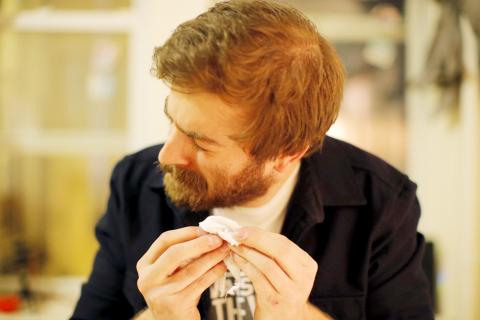Love at first whiff is the idea behind Smell Dating, a New York matchmaking service that promises to help single people sniff out their perfect match by breathing in the odors from dirty T-shirts.
Artist Tega Brain, who teaches at New York’s School for Poetic Computation, and Sam Lavigne, an editor and researcher at New York University (NYU), created Smell Dating, which they describe as an art project.
Each of its first 100 clients received a T-shirt to wear for three days straight without bathing. The clients then mailed the T-shirts back to Brain and Lavigne’s “Sweat Shop” at NYU, where they were cut into swatches. Smell Dating then sent batches of 10 mixed swatches back to the clients to sniff this week.

Photo: Reuters
A match will be made if one client likes the scent of another and the olfactory attraction is mutual. In other words, if “Client 55” likes “Client 69” and vice versa, put a heart around it, Brain said.
The idea is based on the science of pheromones, the chemical signals that creatures from gerbils to giraffes send out to entice mates.
Clients, who pay a one-time fee of US$25, dive in nose-first, unaware of a potential smell-mate’s age, gender or sexual orientation.
“Most normal dating services, you rely on profile pictures, assumptions that come from visual information,” Brain said. “You either really like the smell of someone or you don’t. It’s much more innate.”
On Wednesday, 25-year-old NYU graduate student Jesse Donaldson excitedly opened the package of white swatches in individually numbered plastic bags that had arrived at his apartment in Brooklyn.
He said he hoped Smell Dating could help where other popular matchmaking services had failed.
“I’m like so many other people in New York City, using Tinder, using OK Cupid, and my main issue with these things is you feel like you’re shopping for somebody, as opposed to making a genuine connection with another human being,” Donaldson said.
Brain said she and Lavigne consulted “a lot of smell researchers” about their art project, which explores whether a person’s body odor can trigger Cupid’s arrow.
“We wanted to see if people would be interested in meeting other people just based on this one bit of information, rather than this avalanche of information that you usually get,” Lavigne said as he watched volunteers wearing hooded white jumpsuits and blue rubber gloves cut up the worn T-shirts at the Sweat Shop.
“Whoa, this one is ready to go,” said a worker, wincing as he sniffed a swatch before putting it into a plastic bag marked No. 34.
In Brooklyn, Donaldson tore into the first plastic bag, removed the swatch and sniffed.
“Fresh-done laundry,” he said.
He opened another and inhaled.
“Oh. That is nutty. I’m just going to seal that back up,” he said.
Then he brought yet another swatch to his nostrils, nodded and said: “Oh.”
He savored a second whiff and added: “That’s my match.”

To many, Tatu City on the outskirts of Nairobi looks like a success. The first city entirely built by a private company to be operational in east Africa, with about 25,000 people living and working there, it accounts for about two-thirds of all foreign investment in Kenya. Its low-tax status has attracted more than 100 businesses including Heineken, coffee brand Dormans, and the biggest call-center and cold-chain transport firms in the region. However, to some local politicians, Tatu City has looked more like a target for extortion. A parade of governors have demanded land worth millions of dollars in exchange

Hong Kong authorities ramped up sales of the local dollar as the greenback’s slide threatened the foreign-exchange peg. The Hong Kong Monetary Authority (HKMA) sold a record HK$60.5 billion (US$7.8 billion) of the city’s currency, according to an alert sent on its Bloomberg page yesterday in Asia, after it tested the upper end of its trading band. That added to the HK$56.1 billion of sales versus the greenback since Friday. The rapid intervention signals efforts from the city’s authorities to limit the local currency’s moves within its HK$7.75 to HK$7.85 per US dollar trading band. Heavy sales of the local dollar by

Taiwan Semiconductor Manufacturing Co’s (TSMC, 台積電) revenue jumped 48 percent last month, underscoring how electronics firms scrambled to acquire essential components before global tariffs took effect. The main chipmaker for Apple Inc and Nvidia Corp reported monthly sales of NT$349.6 billion (US$11.6 billion). That compares with the average analysts’ estimate for a 38 percent rise in second-quarter revenue. US President Donald Trump’s trade war is prompting economists to retool GDP forecasts worldwide, casting doubt over the outlook for everything from iPhone demand to computing and datacenter construction. However, TSMC — a barometer for global tech spending given its central role in the

An Indonesian animated movie is smashing regional box office records and could be set for wider success as it prepares to open beyond the Southeast Asian archipelago’s silver screens. Jumbo — a film based on the adventures of main character, Don, a large orphaned Indonesian boy facing bullying at school — last month became the highest-grossing Southeast Asian animated film, raking in more than US$8 million. Released at the end of March to coincide with the Eid holidays after the Islamic fasting month of Ramadan, the movie has hit 8 million ticket sales, the third-highest in Indonesian cinema history, Film